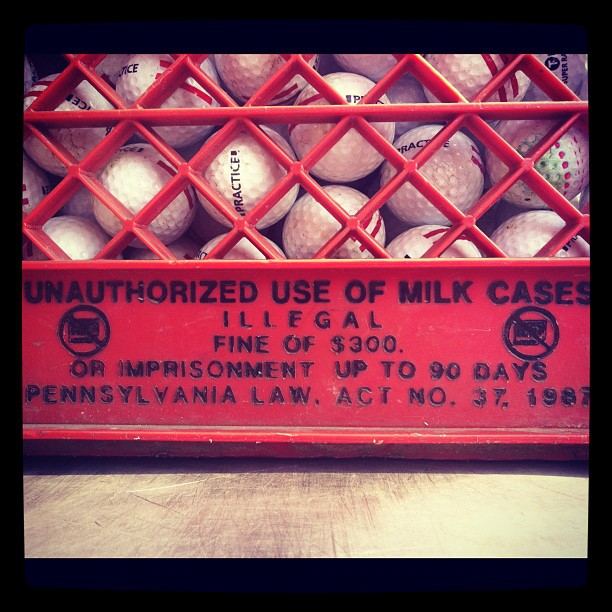The Black Market in White Liquid

Pictured above is the evidence of a crime — and the law being violated. Specifically, the red item above is a milk crate, and, as the the black (blue?) letters spell out, unauthorized used of a milk crate such as this one, in Pennsylvania at least, is a crime (punishable by a fine of up to $300 and 90 days in the clink). But that’s not milk in the crate. Those are golf balls. And golf ball storage? That, almost certainly, is not an authorized use of the milk crate depicted.
Okay, the person using the milk crate in this fashion isn’t likely to go to jail. But that’s not because the warning on the crate is a toothless scare tactic. It’s not. First off, stealing other people’s property — even if that property is merely an empty milk crate — is generally illegal. But more specifically, in Pennsylvania and other places — Virginia, for example — stealing milk crates is explicitly disallowed. Really. Here is the relevant part of the Pennsylvanian law and here’s the one from Virginia. And they’re not alone — many other states have similar laws. And those laws are being enforced more often than you’d expect.
That’s because, at least recently, milk crates have been the target of well-developed crime sprees.
Anti-milk crate theft laws date back to the late 1980s, likely due to an effort to protect the price of milk. A 1989 New York Times article noted that, at the time, “the dairy industry [in New Jersey alone] spends about $4 million a year to replace the crates, an amount that ultimately results in higher milk prices for consumers.” That argument is still true today but, among consumers and citizens, it’s fallen kind of flat. So GotMilkCrates.com — an industry site operated by the International Dairy Foods Association (a lobbyist group) — takes a secondary position: milk crates are environmentally friendly, at least when used as intended. The milk crates, they argue, can be reused many times over by a dairy, for years if not decades, and because “the plastic milk crate is the only secondary packaging needed for milk delivery” and “no cardboard or plastic wrap is used,” there’s little environmental impact. But that’s only true if people don’t steal milk crates. That, the dairy industry asserts, requires that the laws be enforced.
But for decades, the laws were mostly ignored. That’s because most of the thefts were innocuous and low volume — people would ask their grocer if they could take an empty milk crate or two home (for example), and then use them for easily-accessible storage. That changed, however, about a decade ago, when professional criminals got in on the act. No, they didn’t need a place to store their golf balls or bags of small, unmarked bills. They wanted the crates for their plastic. A 2006 article in the Pittsburgh Post-Gazette sums up the desire:
Dairy and soft-drink industry people cite mounting evidence that the thieves are either plastic recyclers or bandits who sell to recyclers, who then grind up the plastic and sell it to toy makers or other manufacturers who may not know that they are buying stolen goods. Recyclers have been arrested in southern California and Detroit for grinding up stolen plastic, and dairy and soft-drink industry officials and police suspect recyclers in Pennsylvania, Georgia and Florida are doing the same.
According to Modern Farmer, the milk crate loss cost the dairy industry around $80 million in 2012. And to make matters worse, the crime wave has spread to baker’s trays (these) — also made of high-density plastic — and shipping containers; there’s a lot of demand for these type of recyclables, questions unasked.
To combat the loss, many dairies and other food manufacturers are hiring private investigators whose job it is to figure out where the crates are going — and to do what they can to bring the scofflaws to justice. As one private eye — a former police officer — told the Wall Street Journal, “I did shootings, robberies, drugs [as a cop, but now] I spend every day of the week on plastic.”
 Bonus Fact: Of the 28 U.S. states that have an official state beverage, 21 have given that honor to milk. The other seven? Alabama (a type of whiskey once made, illegally, in the state), Florida (orange juice), Maine (Moxie, a soft drink), Massachusetts (cranberry juice), New Hampshire (apple cider), Ohio (tomato juice) and Rhode Island (coffee milk). Two other states have two official beverages — milk and one other. Those states are South Carolina, which also honors tea, and Nebraska, which holds Kool-Aid in high regard.
Bonus Fact: Of the 28 U.S. states that have an official state beverage, 21 have given that honor to milk. The other seven? Alabama (a type of whiskey once made, illegally, in the state), Florida (orange juice), Maine (Moxie, a soft drink), Massachusetts (cranberry juice), New Hampshire (apple cider), Ohio (tomato juice) and Rhode Island (coffee milk). Two other states have two official beverages — milk and one other. Those states are South Carolina, which also honors tea, and Nebraska, which holds Kool-Aid in high regard.
From the Archives: One’s Trash, Another’s Treasure: Why people steal something that you’re willingly leaving for the garbage collectors.
Related: Dairies buy milk crates wholesale, for about $6, give or take. If you really want some — legally — you can get a four-pack for about $33 plus shipping. (It comes to about $10/crate.)
